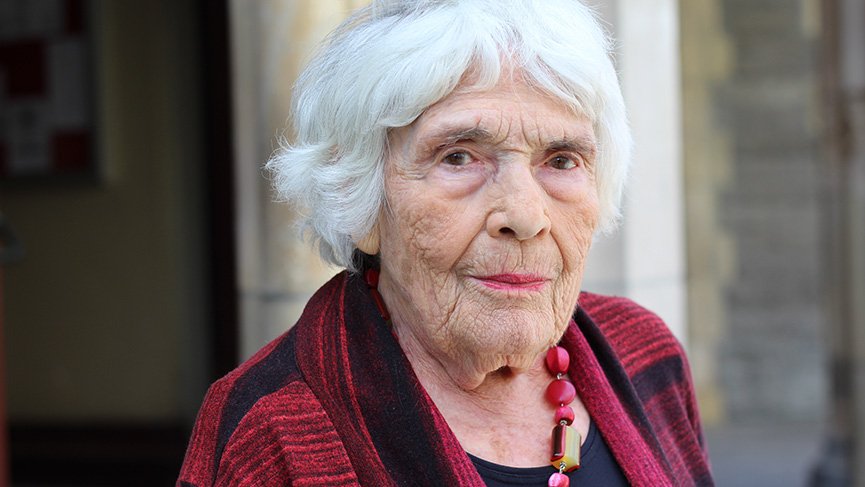“I was shocked by the stories of their tragic lives and deaths.”

Montreal
At the 40th Christian Commemoration of the Shoah held on Sunday May 5, at Christ Church Anglican Cathedral, Holocaust survivor Ilona Flutsztejn-Gruda shared her painful story.
“I was nine years-old at the beginning of World War II. I was lucky enough to avoid the worst, I mean by that the ghettos, the concentration camps and the death camps. My parents were wise enough to flee as far as possible from war zones and German-occupied areas.”
After her first words of introduction, Ilona Flutztejn-Gruda, born in 1930 in Warsaw, Poland, looked at the assembly on this Sunday afternoon in this cathedral downtown Montreal.
On the occasion of the 40th Christian Commemoration of the Shoah, this Holocaust survivor, author of the book Quand les grands jouaient à la guerre (Leméac – Actes Sud, 1999), told the people gathered in this Anglican Church that her parents and her had found out that “most of their family members had been killed by the Germans,” upon returning to Poland after a seven-year exile.
“I remember my aunt Zosia, whom I loved very much, and my uncle Szymon, and his wife and two children, my cousins who were a bit older than me and who often came to our house during the holidays,” she said, eyes closed.
“I was shocked by the stories of their tragic lives and deaths. It was unbelievable.” As an adolescent, she would listen to the stories of survivors who came to visit and who would tell them what they had gone through and how they hid, and would tell stories of denunciations and despair. Those stories are printed in my memory forever,” added Ilona Flutztejn-Gruda.
“There is a need still today to pass down each of their stories.”
As she said to the Christians and the Jews gathered for the commemoration organized by the Christian Jewish Dialogue of Montreal: “Oblivion is not the answer. The stories of their suffering and their deaths need to be documented and kept forever.”
The Right Reverend Mary Irwin-Gibson, Bishop of the diocese of Montreal, invited the participants to show “compassion in view of the huge suffering the Holocaust victims and survivors went through”.
“During this commemoration, we also pray for all the victims of human tragedies still affecting our world.”
The Most Reverend Christian Lépine, Archbishop of Montreal, reminded the audience of the fact that people literally put their lives in danger to save Jews during World War II. They are bestowed with the title “Righteous among the Nations.”
“We also become righteous today. Righteous to those suffering and living in fear, to the victims of discrimination and persecution,” also said the Archbishop during his short speech.
“We are all being called to make the Shoah our home, to remember forever how far horror can go,” he added. “We are confronted with the demanding, yet unavoidable, challenge to admit that the worst can happen. The worst has happened. The worst can still happen today or tomorrow.”br />
One of the strong moments of the commemoration of the Shoah was the lighting of six candles.
“Fire is synonymous of destruction and death,” said Rabbi Sherril Gilbert. “But the flame also symbolizes hope, the light and the future, as expressed by the eternal light that shines in all synagogues and in many churches.”
The second candle, dedicated to the Shoah survivors, “many of whom still bear the physical and psychological scars of those terrible days”, was lit by Ilona Flutsztejn-Gruda.
“This candle brings a promise of life from ash and dust,” declared the Very Reverend Bertrand Olivier, rector of Christ Church Cathedral.

Comment
Comment
Add new comment